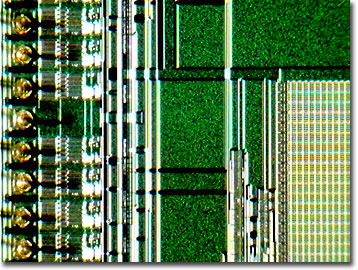Integrated Circuit Image Gallery
Schottky Logic Integrated Circuit
A type of bipolar or junction logic chip (as opposed to a metal-oxide semiconductor field-effect transistor (MOSFET)), the integrated Schottky logic (ISL) circuit is produced by semiconductor manufacturer Texas Instruments. During 1988, TI released standard transistor-transistor logic (TTL), Schottky, and low power Schottky (LS) devices.

View a second image of the Schottky logic chip.
Switching speeds, and therefore propagation delays, are quite large for the standard series of Schottky logic because the transistors are switched from cut off to saturation. Using Schottky diodes in the low power Schottky circuit in combination with the transistors prevents transistor saturation. Schottky diodes are crystal diodes with a semiconductor-metal contact. Because electrons transfer more easily from n-silicon toward the metal layer than the reverse, a Schottky barrier (depleted) layer for electrons develops in the silicon layer. Charge transfers consist exclusively of electrons (as opposed to holes), making these diodes suitable for fast switches or microwave electric rectifiers used in wireless communication systems.
Schottky diodes usually exhibit 1-milliampere reverse current while regular diodes typically perform at 5-microampere reverse current. Not only do the former lower power consumption of the Schottky logic, they also increase speed and noise immunity. The 7400 family of advanced Schottky (AS) logic circuits are used in pseudorandom-bit-sequence (PRBS) generators. Operating at 50 MHz clock speeds, this family of Schottky logic chips exhibits edge speeds of approximately 0.6 nanoseconds. Because of the edge speed, board traces over 2 inches long are susceptible to transmission-line effects. Advanced low power Schottky logic chips (ALS) provide a full spectrum of over 130 bipolar logic functions. ALS is used where speed is less critical, and power and speed performance optimization is at a premium. The advanced low power Schottky logic family includes gates, flip-flops, counters, drivers, transceivers, multiplexers and other electronic silicon devices.
Contributing Authors
Omar Alvarado, Thomas J. Fellers and Michael W. Davidson - National High Magnetic Field Laboratory, 1800 East Paul Dirac Dr., The Florida State University, Tallahassee, Florida, 32310.
BACK TO THE INTEGRATED CIRCUIT IMAGE GALLERY
BACK TO THE DIGITAL IMAGE GALLERIES
Questions or comments? Send us an email.
© 1995-2025 by Michael W. Davidson and The Florida State University. All Rights Reserved. No images, graphics, software, scripts, or applets may be reproduced or used in any manner without permission from the copyright holders. Use of this website means you agree to all of the Legal Terms and Conditions set forth by the owners.
This website is maintained by our
Graphics & Web Programming Team
in collaboration with Optical Microscopy at the
National High Magnetic Field Laboratory.
Last Modification Friday, Nov 13, 2015 at 01:19 PM
Access Count Since September 17, 2002: 13635
Visit the website of our partner in introductory microscopy education:
|
|
